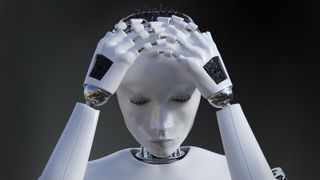AI 'golden age' at risk from misinformation
Real work in AI is being drowned out by talk of job losses and robot revolutions

We could be about to enter into a new "golden age" with the development of AI, but governments have very little clue as to how to best prepare for it.
That's according to Stuart Russell, professor of electrical engineering and computer sciences at UC-Berkeley, who argues that fears about the rise of artificial intelligence come from a lack of understanding at the highest levels.
"We could be about to enter a new golden age," said Russell, speaking at IP Expo in London on Thursday. "Access to significantly greater intelligence would be a step change in civilisation, but you don't hear a lot about the upside. AI programs are racist, sexist, Telsa autonomous cars are killing people, it's subverting the democratic process..."
"I actually think [the rise of AI] is inevitable. But governments need to stop thinking that they need to train one billion data scientists, we don't need those."
However, there exists a great deal of fear emerging from both governments and high-profile technology leaders that the emergence of AI will prove too disruptive. Tesla CEO Elon Musk has described the technology as "summoning the devil", while Bill Gates has said we will need to tax robot workers to cover national incomes.
The problem, according to Russell, lies with the muddied ideas about what we want from artificial intelligence, and that any attempts to create something that may one day replace us should be halted.
"We do not want intelligent machines," explained Russell. "What we want is machines that are beneficial, to us in particular. But it needs to be provably beneficial. If you give an objective to a machine, you're giving it a reason to stay alive. If a machine is asked to make a cup of coffee, it will know that it can't do that if it's switched off - the exact plot to 2001: A Space Odyssey."
Get the ITPro. daily newsletter
Receive our latest news, industry updates, featured resources and more. Sign up today to receive our FREE report on AI cyber crime & security - newly updated for 2024.
According to Russell, a great deal of the real work in AI is being ignored. For example, an AI programme developed in conjunction with the UN, known as NET-VISA, is currently being used to monitor seismic activity to enforce a ban on Nuclear testing, which is proving instrumental in the gathering of evidence against the activities of North Korea.
"I think that governments, corporations and our education systems need to prepare for large-scale economic disruption, particularly to employment," said Russell. However, he believes that deep learning, or the idea that a person can be replaced entirely by a robot, is still a long way off.
However, he added that the economic benefit ahead far outweighs any potential drawback, as if we are able to achieve "human-level AI" the monetary value created has the potential to exceed current global GDP.
Dale Walker is the Managing Editor of ITPro, and its sibling sites CloudPro and ChannelPro. Dale has a keen interest in IT regulations, data protection, and cyber security. He spent a number of years reporting for ITPro from numerous domestic and international events, including IBM, Red Hat, Google, and has been a regular reporter for Microsoft's various yearly showcases, including Ignite.
Most Popular






